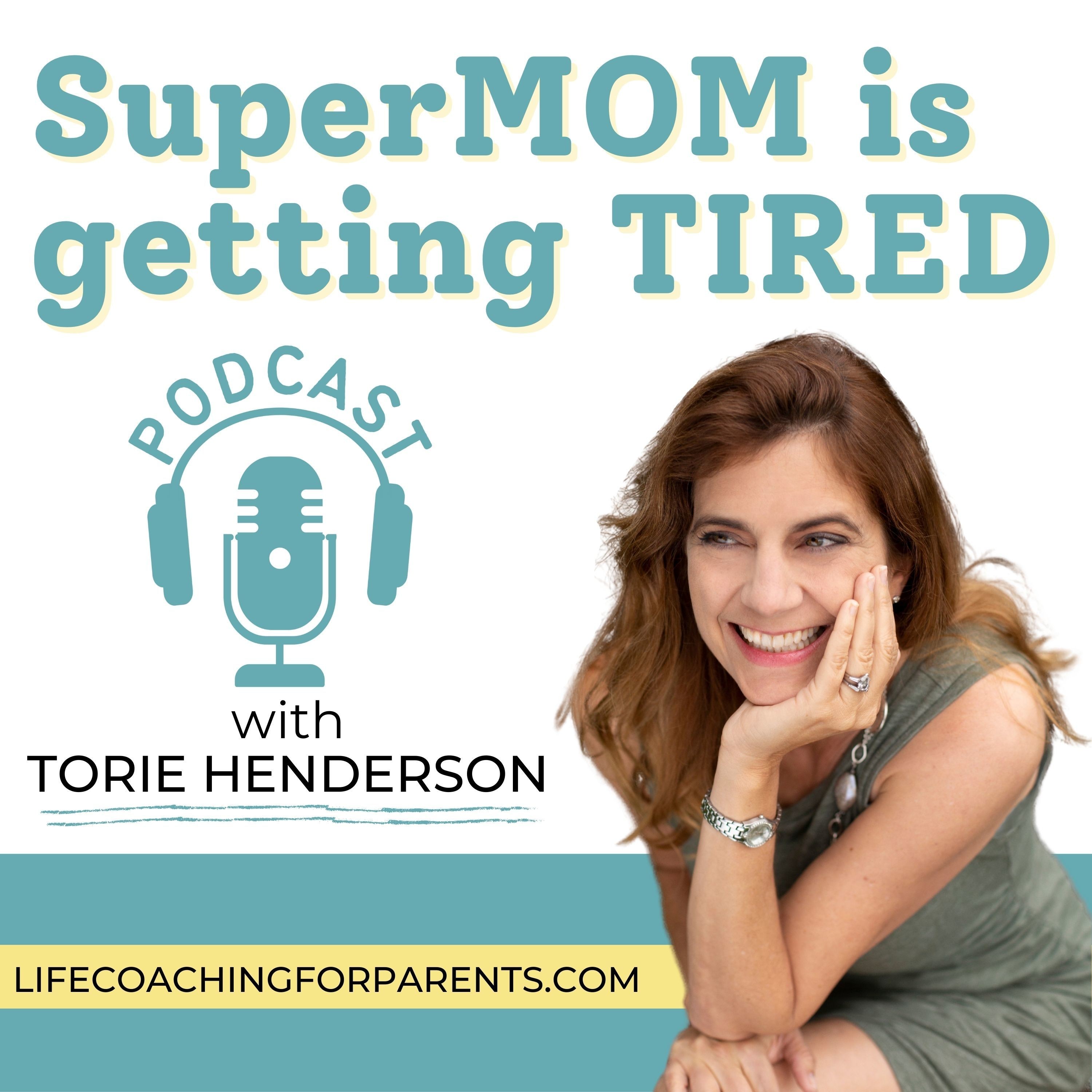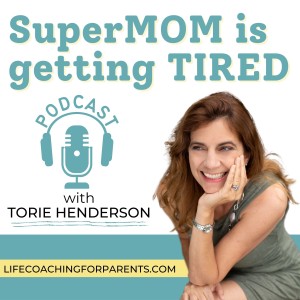
75.1K
Downloads
173
Episodes
You love being a mom but get overwhelmed, lost and resentful by all the parenting responsibilities. Listen as life coach, teacher and parent educator, Torie Henderson, answers common parenting dilemmas from hard working Supermoms. Are you exhausted from working hard all day but still feel like you haven’t accomplished anything? Do you want to feel calm, energized and in control? Then this podcast is for you.
Episodes

Tuesday Mar 23, 2021
Helping Your Teen with Social Anxiety
Tuesday Mar 23, 2021
Tuesday Mar 23, 2021
Episode #95 - Helping Your Teen with Social Anxiety
Question of the Day:
“I’m worried about my daughter. She is 14, a freshman in high school, and socially seems to be withdrawing more and more. Her grades are fine, but she chose to continue online learning instead of returning to school and this concerns me.
She spends most of the day in her room. I try to get her to walk the dog with me, go shopping or out to dinner, but she would rather stay home. On the occasions where I make her come with me (dentist appointments or important family things) she looks visibly uncomfortable. She puts her hood on, head down and walks briskly, trying to avoid any contact with other people.
It’s not just my invitations she is turning down. I hear her declining invitations with friends, too. She’ll say she doesn’t feel like going out and doing things but when she comes home after exercising or socializing, her face brightens and she seems happier.
Could my daughter be dealing with social anxiety or depression? Is this just a negative side effect of the pandemic that will go away with time? How do I help her? I have suggested talking to someone (therapist) but she has turned me down. If she won’t talk to me or her friend about it, how can I get her to talk to a stranger?”
Seema
Parent Educator Answer: How do I help my teenager’s mental health?
Mental health is going to be the issue of the decade.
Meghan Markle talked about it with Oprah.
Lady Gaga and Justin Bieber are talking about it.
Research continues to show a very strong correlation between time spent on social media and increasing anxiety and depression in teen girls.
This pandemic and its social distancing gave already anxious teens a great excuse to stay home and not engage with peers.
We just spent the last 12 months worried that our friends could kill us.
This is going to take a toll.
What are the basics of mental health?
Sleep, nutrition, love, exercise, social acceptance, physical safety, the ability to pursue things you are interested in, the ability to be your authentic self, a sense of purpose and community.
There are ways in which modern living is negatively impacting the mental health of our children and adolescents, even before the pandemic.
Let’s say a child has a bad day at school.
His teacher embarrassed him in front of the class, his friend said something rude at lunch time, he got a bad grade, whatever.
If he was to walk home from school with a friend, by the time he got home, he would feel better.
The combination of exercise, positive social interaction, and being outside in nature, would help him process his negative emotions so that they aren’t such a big deal anymore.
When we pick our kids up and drive them home, these negative emotions don’t have a place to go. They stay bottled up. If our kid jumps straight to homework or video games, it distracts rather than releases. When we ask “How was school? Did you have a good day? Were your friends being nice to you?”
We think we are showing interest and caring but it would probably be more effective to tell a joke, share some embarrassing mistake you made that day, or talk about fun weekend plans. Sometimes our questions can feel like pressure to be perfect, have everything go well, and be happy all the time.
Let’s get back to Seema’s questions about her daughter.
Could her teenager be dealing with anxiety and depression? Yes.
Could this be a negative side effect of the pandemic? Yes.
Or she could have had a predisposition for it and it would have shown up at 14 anyway. If she had separation anxiety and stranger anxiety as a toddler, it’s possible it was always going to re-emerge during adolescence.
“How do I help her? How do I get her to talk to a stranger when she won’t even talk to me or her friend?”
The number one thing parents can do to help their child who is struggling with mental health is to educate and de-stigmatize.
If you found out your daughter had diabetes, you would learn as much information as you could and make sure she understood all the details of how her endocrine system worked. You would make sure she knew how to keep herself healthy and thriving. If she complained and said, “I don’t want to get poked.” or “I don’t want to see the doctor.” you would make it non-negotiable. You would do everything in your power to kindly but firmly, make sure she had the tools she needed to thrive.
You would do all of this, even to the point of being annoying, knowing this is an ongoing battle, a part of her experience here on earth that is outside of your control. You wouldn’t hide this truth from anyone or feel ashamed. You would be honest about the struggles and challenges, educating family members on how they can best support your daughter.
I believe in viewing anxiety and depression in a similar way. Mental health struggles are a common result of living in America’s fear based culture with modern amenities, a sedentary lifestyle and a disconnection to nature, community, spirit, and purpose. Emotions are contagious. When the people around you are angry and scared, parents are stressed, peers are insecure, and social media implies perfection is the goal, it doesn’t take much to tip the scales.
Some kids are like canaries in the coal mines, more sensitive than others. They are letting us know that the air we are breathing is toxic. A lot of the culture in America is toxic.
The first thing you can do is to help your child manage any mental health issue is educate and de-stigmatize. Talk to her pediatrician. Learn together what causes anxiety and what helps it. Help her get a diagnosis that feels right to her.
Overcoming anxiety is a marathon, not a sprint, but it is extremely treatable!
Here is a list of 21 things that have been proven to help with overcoming anxiety:
Regular exercise (especially running, dancing and yoga).
Life Coach or Therapist who uses: Cognitive Behavioral Therapy, Exposure Therapy, or Acceptance and Commitment Therapy.
Breath-work
Medication
Laughter
Keep a gratitude journal, thoughts and dreams journal, or self help workbooks like Anxiety Workbook for Teens, Self Compassion Workbook for Teens.
Set a goal (that your spirit yearns for) and work towards it.
Feel needed-volunteer with kids, animals, elderly, etc.
Explore your creativity - art, music, design, storytelling, cooking
Meditation and mindfulness
Sunshine and nature
Do one thing that scares you everyday (expand your comfort zone)
Write thank you notes or perform random acts of kindness.
Take steps towards making your dream a reality.
Tapping or Emotional Freedom Technique
Equine Therapy
Hypnosis
EMDR -Eye movement desensitization and reprocessing
Somatic Therapy
Energy Healing and Reiki
Using science to manage the nervous system and primitive thinking.
Got more? Post it in the Supermom is Getting Tired facebook group!
If it were me, I would tell my daughter that God gave her anxiety for a reason and her job is to use it to help others. In order to help others, she’s going to need to help herself first.
I would present her this list like a menu and say, you can choose one or all. We are here to support your dreams no matter how big or small. If your dream is to attend high school and not feel like everyone is judging you, we will make that happen. If your dream is to live in a treehouse in Costa Rica rescuing toucans, we will support you.
Encourage your daughter to use her imagination to create WHAT SHE WANTS, rather than focusing on all the ways she is not measuring up to societal expectations.
The one thing on this list I would make mandatory is to “Do one SMALL thing everyday that scares you.”
When you avoid activities that trigger your fears, they get bigger and scarier inside your mind. I would INSIST she do something everyday that feels slightly uncomfortable, scary, and vulnerable (to her). Have her order a pizza over the phone, invite a friend to go shopping or offer to walk the neighbor’s dog. Celebrate minor victories with her until they become a habit.
Life Coaching Answer: What gets in our way of accepting, supporting, and educating our anxious teens?
Our own anxieties!
When we see our beloved teenagers acting sullen and negative, withdrawing from society, and being scared to meet new people or take on new challenges, it triggers OUR anxiety! It’s like watching your child BLEEDING OUT! It feels urgent; like a very scary emergency situation and we need them to do something NOW so that we can feel better QUICK!
We get angry and annoyed, yelling at them to get over their ridiculous issues that make no sense!
We feel guilty and embarrassed, as though it’s our fault our child is struggling in this way and we should have done more to prevent it.
We get defensive, thinking about all the time, money, and energy we put into giving this kid the best of everything. All we want is for her to be happy and she can’t even give us that!
We get overly involved, pleading with them. “PLEASE say yes to your friend’s invitation. PLEASE join a club or a sport. I NEED you to be happy so I can relax and stop obsessing about your happiness.”
We worry. We catastrophize and futurize. “She’s never going to go to college or leave home. She won’t get her driver’s license and I’ll be stuck obsessing about her mental health for the rest of my life!"
I created a program specifically for moms who are living with a struggling teen. I call it Leading Your Teen and it’s designed to help moms learn to lead by example instead of trying to "fix" their teen. In this coaching program, I help moms figure out when to step in, when to let go, and learn to love more but care less. We work on releasing our own fears, worries, guilt, anxiety, and frustration so that we can be the supportive, encouraging moms we want to be.
Go to www.LeadingYourTeen.com to learn more.

No comments yet. Be the first to say something!